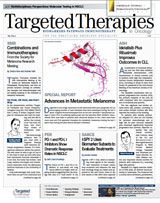NY-ESO-1 Antigen Spreading With Decitabine Increases Immunotherapy Response
Treatment with decitabine prior to administration of chemotherapy and a cancer vaccine yielded clinical benefit for women with recurrent ovarian cancer, suggesting that this combinatorial chemoimmunotherapy may provide a new treatment option.
Kunle Odunsi, MD, PhD
Treatment with decitabine prior to administration of chemotherapy and a cancer vaccine yielded clinical benefit for women with recurrent ovarian cancer, suggesting that this combinatorial chemoimmunotherapy may provide a new treatment option for patients with this disease, according to a study published inCancer Immunology Research.
“NY-ESO-1 is one of the few tumor antigens that have restricted expression in normal tissues but become aberrantly expressed in epithelial ovarian cancers and other solid tumors, so we focused on this antigen as the lead candidate for development of cancer immunotherapy,” said Kunle Odunsi, MD, PhD, of Roswell Park Cancer Institute in Buffalo, New York, who is the principal investigator of the study.
“However, we observed that this antigen is not uniformly expressed by epithelial ovarian cancers, so our goal was to force the expression of NY-ESO-1 on ovarian cancer cells in order to allow the immune system to recognize and attack them,” he said in an AACR press release. “Expression of NY-ESO-1 is regulated by an epigenetic process called DNA methylation. Therefore, we tested the hypothesis that epigenetic reprogramming of NYESO- 1 using the demethylating agent decitabine will augment vaccine-induced immunity,” he added.
Odunsi and colleagues conducted a phase I dose-escalation trial of decitabine, to which they recruited 12 women with advanced, progressive epithelial ovarian cancer that had not responded to multiple lines of chemotherapy, with an estimated progression-free survival (PFS) time of 3 months. Although clinical results were not a focus of this trial, according to Odunsi, the research team observed evidence of clinical benefit in up to 60% of the patients with chemotherapyresistant tumors. “The combination of a demethylating agent, chemotherapy, and cancer vaccine may have enabled this remarkable effect,” he said.
All patients received decitabine on day 1, the chemotherapy drug doxorubicin on day 8, and the cancer vaccine (NY-ESO-1 protein with Montanide and GM-CSF) on day 15.
According to the published article, preclinical studies using EOC cell lines showed that decitabine treatment enhanced both NY-ESO-1 expression and NY-ESO-1specific CTL-mediated responses. Therefore, the investigators established the best sequence of drug administration: decitabine was effective only when administered before chemotherapy, and it was ineffective if given after chemotherapy; vaccine administration was the last step.
The clinical trial participants were randomly assigned to receive a low, middle, or high dose of decitabine. Of the 10 patients evaluable for clinical response, five had stable disease for up to 7.8 months, and one had a partial response with disease remission that lasted 5.8 months. All patients from the low- and middle-dose cohorts of decitabine showed clinical benefit, whereas one-third of the patients who received the high dose showed benefit. These data suggest that lower doses of decitabine are associated with improved clinical response using this regimen. The treatment was well tolerated, and adverse events included hematologic side effects that were clinically manageable, according to Odunsi.
“One of the most remarkable results in terms of immune responses was that we were able to evoke what we call ‘antigen spreading,’” he said. Although the research team immunized against a single target [NY-ES0-1], they also found that they were able to induce immune responses against three other antigens, against which they did not immunize. “Because of the possibility that these additional antigens may have contributed to the clinical responses, they will be included in future vaccine studies of targeted therapy,” Odunsi toldTargeted Therapies.
Odunsi and co-principal investigator Adam R. Karpf, PhD, from Fred and Pamela Buffett Cancer Center in the University of Nebraska Medical Center in Omaha, are currently planning a phase II trial for 2014 at Roswell Park Cancer Institute and the Fred and Pamela Buffett Cancer Center to test whether or not this treatment approach lengthens PFS in patients with ovarian cancer. The study will include patients with chemotherapy-resistant ovarian cancer.

Savona Discusses First-Line JAK Inhibition for Patients With Myelofibrosis at Risk of Anemia
April 17th 2024During a Case-Based Roundtable® event, Michael Savona, MD, and participants discussed the case of a patient with myelofibrosis and moderate anemia receiving JAK inhibitor therapy.
Read More